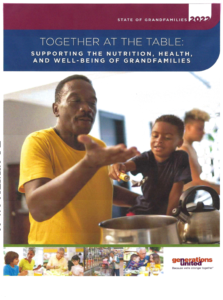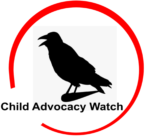 Generations United has released a new report on the nutrition, health, and wellbeing, of grandfamilies. Titled: Together at the Table, the report provides key facts and findings, key recommendations for Federal Policy, State and Local Practice, and Research. It covers food and nutrition challenges through the eyes of grandfamilies; the impact of hunger and food insecurity, including the disproportionate risk for grandfamilies, the dangers, and the increase in food insecurity due to the impact of Covid-19.
Generations United has released a new report on the nutrition, health, and wellbeing, of grandfamilies. Titled: Together at the Table, the report provides key facts and findings, key recommendations for Federal Policy, State and Local Practice, and Research. It covers food and nutrition challenges through the eyes of grandfamilies; the impact of hunger and food insecurity, including the disproportionate risk for grandfamilies, the dangers, and the increase in food insecurity due to the impact of Covid-19.
The report also speaks to the critical role of federal food and nutrition programs in addressing food insecurity and the challenges faced by grandfamilies in accessing these programs.
According to Appendix A: State Data on Children in Grandfamilies, from 2020-2022, 3% (26,000)of All Oregon children were in Kinship Care (Grandfamilies). This percentage includes children in grandfamilies and kinship families both inside and outside of foster care.
In 2020, 34% of the children in Oregon foster care were in kinship care which equals 2,038 children.
To read or download a copy of this report, click here or go to the following link: <https://www.gu.org/app/uploads/2022/10/2022-Grandfamilies-Report-FINAL-WEB.pdf>
Key Facts and Findings
8 million children live with a relative other than their parent who is the head of the household.
About 2.5 million children are being raised by a relative or close family friend and do not have a parent living in the household.
More than 2.4 million grandparents are householders who are responsible for grandchildren living with them.
One in four grandparent-headed households experiences food insecurity.
The rate of food insecurity for grandparent-headed households (25%) is more than 60 percent higher than the rate for all households with children (15%).
The rate of food insecurity for older (60+) grandparent-headed households (22%) is more than three times higher than the rate of comparable households with no children (7%).
Only 42 percent of grandparent-headed households with grandchildren under age 18 and no parent present and with low incomes participated in SNAP in 2019.

